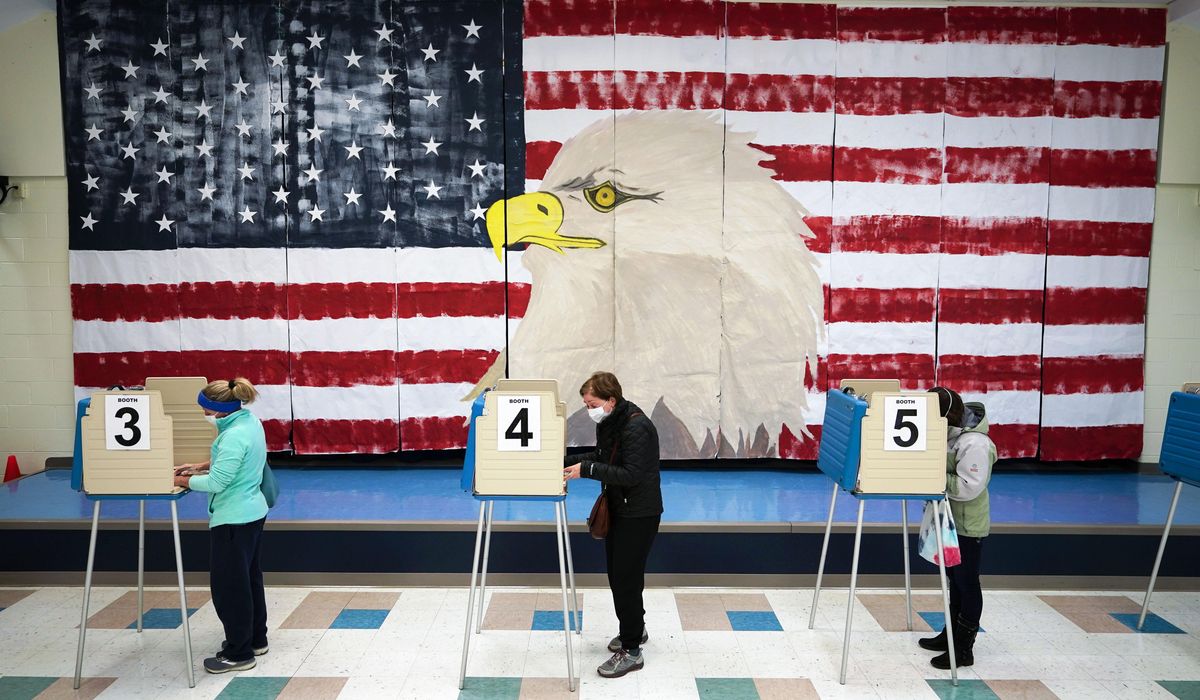


The U.S. intelligence community said it has observed foreign adversaries scanning election infrastructure ahead of the contentious November election, raising concerns that hostile powers are probing America’s defenses for any vulnerability.
The new alarm from the Office of the Director of National Intelligence on Monday about heightened risk to America’s voting apparatus comes with just under 100 days remaining until Election Day.
Government officials are on edge about foreign forces looking to exploit the political process to their advantage and top intelligence officials gave reporters a glimpse at their efforts to guard against foreign threats.
“We haven’t seen any efforts by foreign actors to conduct what we consider election interference, which is to prevent the United States from conducting [an] election,” an intelligence official told reporters. “There is, however, efforts to scan networks related to election infrastructure.”
Officials declined to provide details about the foreign foes scanning America’s election infrastructure, including who was responsible.
Such scanning is not new. The FBI spotted an unknown actor in June 2016 scanning the website of a state board of election, according to a House Permanent Select Committee on Intelligence report in 2018 on Russian active measures. The FBI recommended in 2016 that every state search activity logs for similar activity.
In 2024, adversaries such as China and Russia are turning to private-sector marketing and public relations firms to do their dirty work, according to intelligence officials. The firms can typically move more nimbly and with fewer bureaucratic hurdles than their government counterparts.
“Moscow is leveraging Russia-based influence-for-hire firms to shape public opinion in the United States, including with election-related operations,” the Office of the Director of National Intelligence said in a statement. “These firms have created influence platforms, directly and discreetly engaged Americans, and used improved tools to tailor content for U.S. audiences, while hiding Russia’s hand.”
Intelligence officials said China’s government, meanwhile, collaborated with a “China-based technology company” to advance the communist regime’s covert influence operations, seeking more efficient ways to create content targeted to local audiences.
Iran appears to have ramped up its efforts to influence the presidential election, which intelligence officials said involved “vast webs of online personas and propaganda mills” to spread disinformation and exacerbate tension over the Israel-Gaza conflict.
“Foreign actors continue to rely on witting and unwitting Americans to seed, promote and add credibility to narratives that serve the foreign actors’ interests,” the ODNI said in a statement.
Intelligence officials declined to talk about the attempted assassination of former President Donald Trump on July 13, citing the ongoing law enforcement investigation.
Similarly, the officials declined to answer whether they knew if foreign forces sought to sway President Biden’s decision to withdraw from the 2024 campaign. No known link between the shooter and a foreign government or terror organization has so far surfaced publicly in the probe.
While the intelligence community placed special emphasis on foreign firms’ political manipulation, Americans are also worried about Big Tech firms’ political agendas.
Pro-Trump users erupted with outrage this week over concerns that social media giants Google and Meta were censoring content involving Mr. Trump.
Users who began typing a Google query about the assassination attempt on Mr. Trump reported getting suggested full searches that did not include the former president. Some people typing in “President Donald” reported seeing suggestions to query for “President Donald Duck” instead of Mr. Trump.
“Wow, Google has a search ban on President Donald Trump!” said Elon Musk on the X social media platform he owns. “Election interference?”
Google spokesperson Lara Levin told The Washington Times no manual action was taken on the search predictions regarding the attempted assassination and that autocomplete results for Mr. Trump were not working correctly.
Ms. Levin said Google’s systems protect against autocomplete predictions associated with political violence, which worked before the attempted assassination and the company is seeking to update its systems now.
Autocomplete results for prominent political figures are failing more broadly as well, according to Ms. Levin. She said the results are “dynamic” and subject to trending queries.
“Autocomplete is currently not working as intended for some searches about the names of several past presidents and the current vice president,” Ms. Levin said in a statement. “We’re looking into these anomalies and working on improvements, which we hope to roll out soon.”
Meta, meanwhile, is facing similar accusations of censorship revealing a bias against Mr. Trump on its platforms. Users who posted a photo of a defiant Mr. Trump raising his fist after surviving the assassination attempt reported seeing the image restricted on Meta’s platforms and a tag added to say fact-checkers found a similar photo was altered.
Meta spokeswoman Dani Lever said the alleged censorship was an error meant to apply to a different image.
“This fact check was initially applied to a doctored photo showing the Secret Service agents smiling, and in some cases our systems incorrectly applied that fact check to the real photo,” Ms. Lever said on X. “This has been fixed and we apologize for the mistake.”
The political effect of any influence operations and Big Tech’s purported blunders are not immediately clear. Big Tech’s rivals, however, are looking to capitalize on the polarized political environment.
Mr. Musk, who has endorsed Mr. Trump’s election bid, amplified X users raising concerns about Google and Meta’s systems. He also accused Meta’s Facebook and Instagram of inflating their usage statistics and he called attention to the political donations of Google employees to Mr. Biden.
• Ryan Lovelace can be reached at rlovelace@washingtontimes.com.
